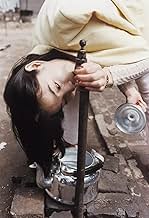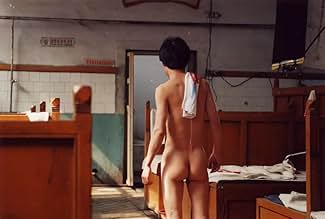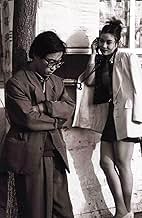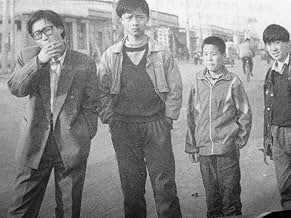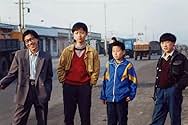IMDb रेटिंग
7.4/10
3.6 हज़ार
आपकी रेटिंग
अपनी भाषा में प्लॉट जोड़ेंA small town pickpocket whose friends have moved on to higher trades finds himself bitter and unable to adapt.A small town pickpocket whose friends have moved on to higher trades finds himself bitter and unable to adapt.A small town pickpocket whose friends have moved on to higher trades finds himself bitter and unable to adapt.
- पुरस्कार
- 7 जीत और कुल 1 नामांकन
फ़ीचर्ड समीक्षाएं
Xiao Wu is to me an incredible lively film.It's like the viewer is totally a part of the scenes he is seeing.the director is a genius in giving you the real-life sense.The raw way of the photography gives you an honest picture of a certain time in China's history... we follow a petty thief Xiau Wu in his 'struggle 'to survive.... everyone around him , his mates from the scenes have all sworn off their criminal pasts and are on the road to be normal citizens...not Xia Wu however.He seems not to be able to break with his 'old'life. What this film shows us in an incredible way to is a piece of Recent Chinese history...the emerging of private enterprise...filmed in the mid 90-ies we as viewers are made very much part of these developments. an excellent and very capturing film in every way ! great job done by the all amateur actors cast.Zhang Ke Jia did an unique job here !
The sound mixing is garbage, with a substantial amount of noise. The dialect cannot be understood. The camera is shaky. The performance is pretty amateurish. The pace is slow. All in all, this film is an unwatchable mess.
I have seen the movie,but the quality of videotape is very bad,and cause the conversation is shangxi(a north province in china),so thought i am a chinese,i can't hardly hear it clearly.speak generelly,this movie reflect ture life condition in small town of china.many of people in town like xiaowu liang had been influenced deep by pop culture from Hongkong or China itself.and xiaowu is a poor low class in China.we are laughing when the movie play,but we are also shocked after the movie over.
"This is a film about our worries and our uneasiness. Having to cope with a dysfunctional society, we take refuge in solitude which is a substitute for dignity
It is finally a film about my native town and about contemporary China." - Jia Zhangke
A sense of longing permeates Xiao Wu, a 1997 film by the acclaimed independent Chinese director Jia Zhangke (Platform, Unknown Pleasures). Set in Jia's home city of Fengyang in Shanxi province, the film is basically a series of incidents in the life of petty thief and pickpocket, Xiao Wu. It is a compelling portrait of an individual in free-fall and, like other films by the director, shows the corrupting influence of Western values on an entire generation of Chinese. The film is reminiscent of the works of Robert Bresson in its use of non-professional actors, environmental sound, and in its spare cinematography by Yu Lik-Wai.
Xiao Wu (Hong Wei Wang) wanders about aimlessly with lots of money to spend and little to spend it on except call girls at the local karaoke bar. He befriends Mei Mei (Hao Hongjian), and they start to develop a tentative relationship but his social awkwardness leads to ultimate rejection. Wu's friends have given up the life of crime and do not want to have anymore to do with him. His best friend, Jin Xiao Yong has just been voted a "Model Entrepreneur" for his activities in cigarette trafficking and does not invite Wu to his wedding. He even returns Wu's gift of money because it is "tainted". The scene between the two old friends discussing the wedding is heartbreaking in the look of rejection on Wu's face.
With no other work to fall back on, Wu is forced to continue his petty crimes, constantly running afoul of the police. In the background, the government has issued an order to round up street criminals. Wu seems bewildered by the fact that his friends do not want to associate with him and he is unable to grasp the meaning of the police crackdown. He grows increasingly alienated and lonely as he loses his friends who go straight, his girl friend Mei Mei who leaves town, and his family who eject him after an argument over a ring.
Jia captures the rhythm and feel of day-to-day life in Fengyang. This is life as it is actually lived, not as a series of dramatic events forced into a narrative structure. His film succeeds not only as social commentary but also as an acutely perceptive realization of the psychology of a self-absorbed individual. One of the most revealing scenes is when Wu stubbornly refuses to sing with Mei Mei at the karaoke bar but instead goes to a bathhouse and, alone and naked, sings a plaintive song to the empty room. After Mei Mei leaves him, things seem to spiral downward for Wu. In a final sequence, he is shown after his arrest, not as a victim or hero, but as an off-screen object to be gazed at and mocked by people in the street. It is a scene of personal tragedy, but in the universality of its compassion, it becomes a spiritual revelation. Xiao Wu is one of the best films of the 90s.
A sense of longing permeates Xiao Wu, a 1997 film by the acclaimed independent Chinese director Jia Zhangke (Platform, Unknown Pleasures). Set in Jia's home city of Fengyang in Shanxi province, the film is basically a series of incidents in the life of petty thief and pickpocket, Xiao Wu. It is a compelling portrait of an individual in free-fall and, like other films by the director, shows the corrupting influence of Western values on an entire generation of Chinese. The film is reminiscent of the works of Robert Bresson in its use of non-professional actors, environmental sound, and in its spare cinematography by Yu Lik-Wai.
Xiao Wu (Hong Wei Wang) wanders about aimlessly with lots of money to spend and little to spend it on except call girls at the local karaoke bar. He befriends Mei Mei (Hao Hongjian), and they start to develop a tentative relationship but his social awkwardness leads to ultimate rejection. Wu's friends have given up the life of crime and do not want to have anymore to do with him. His best friend, Jin Xiao Yong has just been voted a "Model Entrepreneur" for his activities in cigarette trafficking and does not invite Wu to his wedding. He even returns Wu's gift of money because it is "tainted". The scene between the two old friends discussing the wedding is heartbreaking in the look of rejection on Wu's face.
With no other work to fall back on, Wu is forced to continue his petty crimes, constantly running afoul of the police. In the background, the government has issued an order to round up street criminals. Wu seems bewildered by the fact that his friends do not want to associate with him and he is unable to grasp the meaning of the police crackdown. He grows increasingly alienated and lonely as he loses his friends who go straight, his girl friend Mei Mei who leaves town, and his family who eject him after an argument over a ring.
Jia captures the rhythm and feel of day-to-day life in Fengyang. This is life as it is actually lived, not as a series of dramatic events forced into a narrative structure. His film succeeds not only as social commentary but also as an acutely perceptive realization of the psychology of a self-absorbed individual. One of the most revealing scenes is when Wu stubbornly refuses to sing with Mei Mei at the karaoke bar but instead goes to a bathhouse and, alone and naked, sings a plaintive song to the empty room. After Mei Mei leaves him, things seem to spiral downward for Wu. In a final sequence, he is shown after his arrest, not as a victim or hero, but as an off-screen object to be gazed at and mocked by people in the street. It is a scene of personal tragedy, but in the universality of its compassion, it becomes a spiritual revelation. Xiao Wu is one of the best films of the 90s.
This no budget film is shot with a hand held camera. It shows, but this does not affect the quality of the film. The director has made an intense movie about, Chinese street life. However the culture in China is very different from the west, we can see that the problems of little Wu are universal.
क्या आपको पता है
- ट्रिवियाJia Zhang-ke: the man sent by Xiao Yang to return Xiao Wu's wedding present.
- कनेक्शनReferenced in Ren xiao yao (2002)
टॉप पसंद
रेटिंग देने के लिए साइन-इन करें और वैयक्तिकृत सुझावों के लिए वॉचलिस्ट करें
- How long is Pickpocket?Alexa द्वारा संचालित
विवरण
बॉक्स ऑफ़िस
- दुनिया भर में सकल
- $1,569
- चलने की अवधि1 घंटा 50 मिनट
- रंग
- पक्ष अनुपात
- 1.37 : 1
इस पेज में योगदान दें
किसी बदलाव का सुझाव दें या अनुपलब्ध कॉन्टेंट जोड़ें

